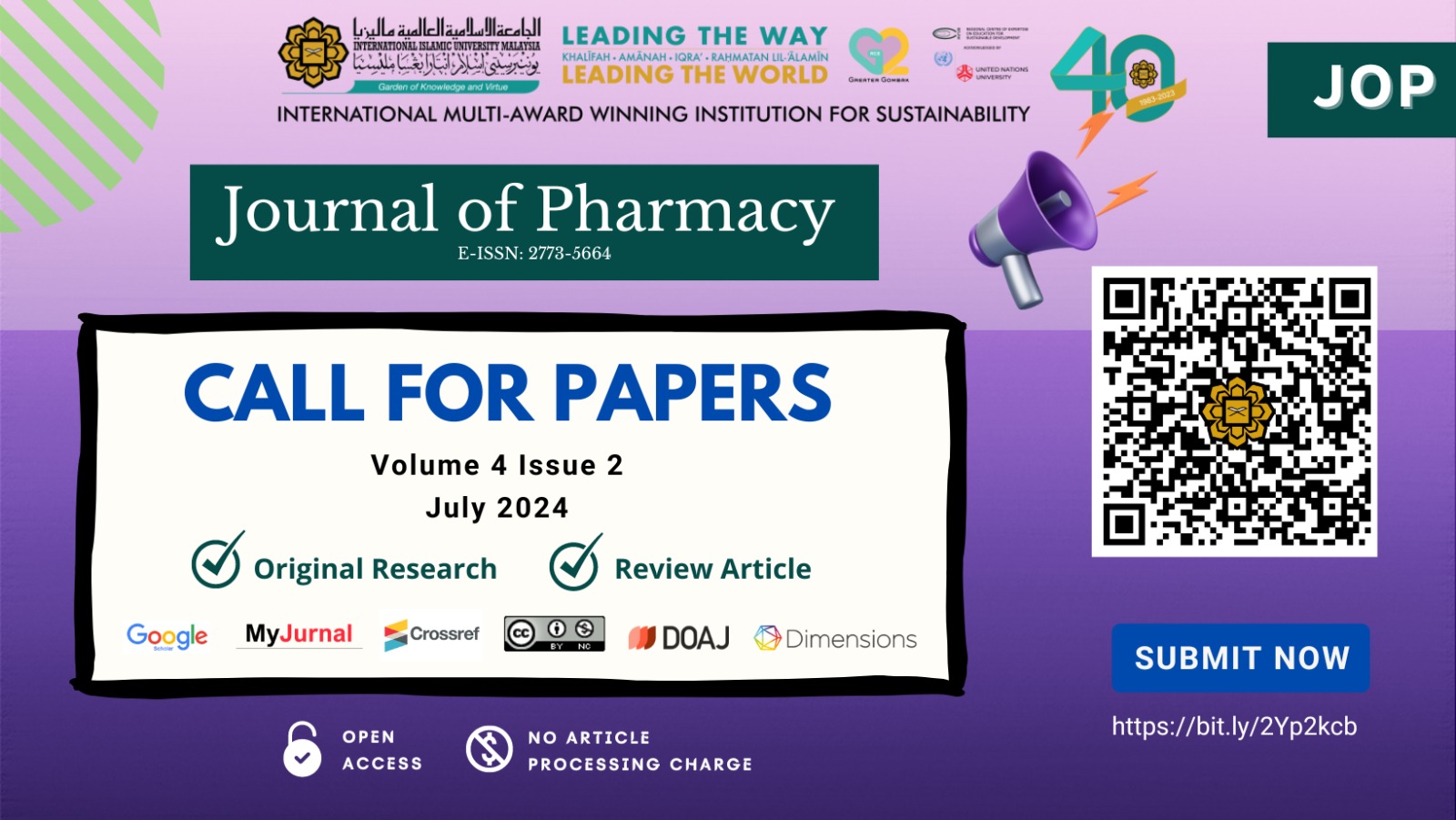Assessment of medication adherence and quality of life among patients with type 2 diabetes mellitus in a tertiary hospital in Kelantan, Malaysia
DOI:
https://doi.org/10.31436/jop.v1i2.66Keywords:
Medication adherence, quality of life, diabetes mellitus, associationAbstract
Introduction: Previous studies have reported the relationship between medication adherence and quality of life are interrelated. However, many of the results were found to be conflicting. This study aimed to assess the level and association of medication adherence and quality of life among type 2 diabetes mellitus patients in Raja Perempuan Zainab II Hospital, Kelantan, Malaysia.
Materials and methods: A cross-sectional survey was conducted among adult type 2 diabetes mellitus patients on treatment for over 1 year using convenience sampling at outpatient. Medication Compliance Questionnaire (MCQ) and revised Diabetes Quality of Life Questionnaire (DQOL) instrument were self-administered to eligible subjects. Data were analysed using GNU PSPP version 0.8.5 and reported for descriptive statistics as well as correlation of both parameters.
Results: A total of 200 patients were recruited and they were mostly at the age of 40 to 60 years old. The mean (SD) score for MCQ was 26.0 (1.6) with the majority of them were non-adherent (55.0%, n=110). The mean (SD) score for overall revised DQOL instrument was 25.5 (8.9) while each domain of “satisfaction”, “impact” and “worry” had mean (SD) scores of 12.0 (5.0), 7.7 (3.4) and 5.9 (2.7), respectively. The scores obtained were only approximately half of the possible range of scores for QoL. There was no significant correlation between total score of medication adherence and quality of life when tested using Pearson’s correlation (r=-0.083, p=0.240). Independent t-test also demonstrated no significant relationship between medication adherence status and quality of life (p=0.883).
Conclusion: Type 2 diabetes mellitus patients in our setting had unsatisfactory adherence but exhibited acceptable quality of life. We observed that both variables were not associated with one another. Further research is warranted to identify potential factors affecting non-adherence to medication.
References
Abdullah, N. F., Khuan, L., Theng, C. A., Sowtali, S. N., & Juni, M. H. (2019). Effect of patient characteristics on medication adherence among patients with type 2 diabetes mellitus: a cross-sectional survey. Contemporary Nurse, 55(1), 27–37. https://doi.org/10.1080/10376178.2019.1583067
Abedini, M. R., Bijari, B., Miri, Z., Shakhs, E. F., & Abbasi, A. (2020). The quality of life of the patients with diabetes type 2 using EQ-5D-5L in Birjand. Health and Quality of Life Outcomes, 18(1), 1–9. https://doi.org/10.1186/s12955-020-1277-8
Ahmad, N. S., Ramli, A., Islahudin, F., & Paraidathathu, T. (2013). Medication adherence in patients with type 2 diabetes mellitus treated at primary health clinics in Malaysia. Patient Preference and Adherence, 7, 525–530. https://doi.org/10.2147/PPA.S44698
Al-Qazaz, H. K., Sulaiman, S. A., Hassali, M. A., Shafie, A. A., Sundram, S., Al-Nuri, R., & Saleem, F. (2011). Diabetes knowledge, medication adherence and glycemic control among patients with type 2 diabetes. International Journal of Clinical Pharmacy, 33(6), 1028–1035. https://doi.org/10.1007/s11096-011-9582-2
Alfian, S. D., Sukandar, H., Lestari, K., & Abdulah, R. (2016). Medication adherence contributes to an improved quality of life in type 2 diabetes mellitus patients: A cross-sectional study. Diabetes Therapy?: Research, Treatment and Education of Diabetes and Related Disorders, 7(4), 755–764. https://doi.org/10.1007/s13300-016-0203-x
Alodhaib, G., Alhusaynan, I., Mirza, A., & Almogbel, Y. (2021). Qualitative exploration of barriers to medication adherence among patients with uncontrolled diabetes in Saudi Arabia. Pharmacy, 9, 16. https://doi.org/10.3390/pharmacy9010016
American Diabetes Association. (2003). Standards of medical care for patients with diabetes mellitus. Diabetes Care, 26(1), S33–S50. https://doi.org/10.2337/diacare.25.1.213
Asche, C., LaFleur, J., & Conner, C. (2011). A review of diabetes treatment adherence and the association with clinical and economic outcomes. Clinical Therapeutics, 33(1), 74–109. https://doi.org/10.1016/j.clinthera.2011.01.019
Brod, M., Alolga, S. L., & Meneghini, L. (2014). Barriers to initiating insulin in type 2 diabetes patients: development of a new patient education tool to address myths, misconceptions and clinical realities. Patient, 7, 437–450. https://doi.org/10.1007/s40271-014-0068-x
Bujang, M. A., Adnan, T. H., Mohd Hatta, N. K. B., Ismail, M., & Lim, C. J. (2018). A revised version of diabetes quality of life instrument maintaining domains for satisfaction, impact, and worry. Journal of Diabetes Research, 1–10. https://doi.org/10.1155/2018/5804687
Burroughs, T. E., Desikan, R., Waterman, B. M., Gilin, D., & McGill, J. (2004). Development and validation of the Diabetes Quality of Life Brief Clinical Inventory. Diabetes Spectrum, 17(1), 41–49. https://doi.org/10.2337/diaspect.17.1.41
Capoccia, K., Odegard, P. S., & Letassy, N. (2016). Medication adherence with diabetes medication: a systematic review of the literature. The Diabetes Educator, 42(1), 34–71. https://doi.org/10.1177/0145721715619038
Cramer, J. a. (2004). A systematic review of adherence with medications for diabetes. Diabetes Care, 27, 1218–1224. https://doi.org/10.2337/diacare.27.5.1218
De Fátima Gusmai, L., De Sá Novato, T., & De Souza Nogueira, L. (2015). The influence of quality of life in treatment adherence of diabetic patients: a systematic review. Rev Esc Enferm USP ·, 49(5), 832–839. https://doi.org/10.1590/S0080-623420150000500019
Farhat, R., Assaf, J., Jabbour, H., Licha, H., Hajj, A., Hallit, S., & Khabbaz, L. R. (2019). Adherence to oral glucose lowering drugs, quality of life, treatment satisfaction and illness perception: A cross-sectional study in patients with type 2 diabetes. Saudi Pharmaceutical Journal, 27(1), 126–132. https://doi.org/10.1016/j.jsps.2018.09.005
GNU Project. (2015). GNU PSPP (Version 0.8.5) [Computer Software]. Free Computer Software Foundation. Boston, MA.
Hale, L., Stokes, T., Scarth, B., Mani, R., Sullivan, T., Doolan-Noble, F., Jayakaran, P., Gray, A. R., Mann, J., & Higgs, C. (2019). Protocol for a randomised controlled trial to evaluate the effectiveness of the diabetes community exercise and education programme (DCEP) for long-term management of diabetes. BMJ Open, 9(2), 1–10. https://doi.org/10.1136/bmjopen-2018-025578
International Diabetes Federation. (2019). International Diabetes Federation Annual Report 2019. https://www.idf.org
Jannoo, Z., Wah, Y. B., Lazim, A. M., & Hassali, M. A. (2017). Examining diabetes distress, medication adherence, diabetes self-care activities, diabetes-specific quality of life and health-related quality of life among type 2 diabetes mellitus patients. Journal of Clinical and Translational Endocrinology, 9, 48–54. https://doi.org/10.1016/j.jcte.2017.07.003
Jimmy, B., & Jose, J. (2011). Patient medication adherence: measures in daily practice. Oman Medical Journal, 26(3), 155–159. https://doi.org/10.5001/OMJ.2011.38
Khayyat, S. M., Mohamed, M. M. A., Khayyat, S. M. S., Hyat Alhazmi, R. S., Korani, M. F., Allugmani, E. B., Saleh, S. F., Mansouri, D. A., Lamfon, Q. A., Beshiri, O. M., & Abdul Hadi, M. (2019). Association between medication adherence and quality of life of patients with diabetes and hypertension attending primary care clinics: a cross-sectional survey. Quality of Life Research, 28(4). https://doi.org/10.1007/s11136-018-2060-8
Marín-Peñalver, J. J., Martín-Timón, I., Sevillano-Collantes, C., & Cañizo-Gómez, F. J. del. (2016). Update on the treatment of type 2 diabetes mellitus. World Journal of Diabetes, 7(17), 354–395. https://doi.org/10.4239/WJD.V7.I17.354
Odegard, P. S., & Capoccia, K. (2007). Medication taking and diabetes: a systematic review of the literature. Diabetes Educator, 33(6), 1014–1029. https://doi.org/10.1177/0145721707308407
Omar, M. S., & San, K. L. (2014). Diabetes knowledge and medication adherence among geriatric patient with type 2 diabetes mellitus. International Journal of Pharmacy and Pharmaceutical Sciences, 6(3), 103–106.
Pera, P. I. (2011). Living with diabetes: quality of care and quality of life. Patient Preference and Adherence, 5, 65–72. https://doi.org/10.2147/PPA.S16551
Trikkalinou, A., Papazafiropoulou, A. K., & Melidonis, A. (2017). Type 2 diabetes and quality of life. World Journal of Diabetes, 8(4), 120–129. https://doi.org/10.4239/wjd.v8.i4.120
Zioga, E., Kazakos, K., Dimopoulos, E., Koutras, C., Marmara, K., Marmara, E.-E., Marmaras, A., & Lavdaniti, M. (2016). Adherence and quality of life in patients with type II diabetes mellitus in Northern Greece. Materia Socio-Medica, 28(4), 258–262. https://doi.org/10.5455/msm.2016.28.258-262
Downloads
Published
How to Cite
Issue
Section
License
Copyright (c) 2021 IIUM Press

This work is licensed under a Creative Commons Attribution 4.0 International License.
Journal of Pharmacy at https://journals.iium.edu.my/ktn/index.php/jp is licensed under a Creative Commons Attribution 4.0 International License.












